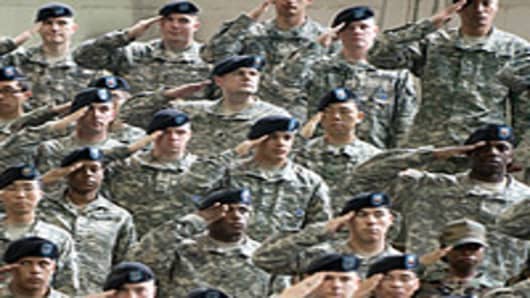When Congress moved in 2008 to sweeten tuition payments for veterans, it was celebrated as a way to ensure that military personnel returning from Iraq and Afghanistan could go to college at no cost and to replicate the historic benefits society gained from the G.I. Bill after World War II.
Now, a year after payouts on the so-called Post-9/11 G.I. Bill started, the huge program has turned into a bonanza of another kind for the many commercial colleges in the United States that have seen their military revenues surge.
More than 36 percent of the tuition payments made in the first year of the program—a total of $640 million in tuition and fees—went to for-profit colleges, like the University of Phoenix, according to data compiled by the Department of Veterans Affairs, even though these colleges serve only about 9 percent of the overall population at higher education institutions nationwide.
As the money flows to the for-profit university industry, questions are being raised in Congress and elsewhere about their recruitment practices, and whether they really deliver on their education promises. Some members say they want to place tighter limits on how much these colleges can collect in military benefits, a move certain federal officials say they would welcome.
These questions come as the for-profit education industry is under increased scrutiny, with the Department of Education proposing regulationsthat would cut off federal aid to colleges whose graduates have extremely low loan repayment rates.
Amid this debate, the industry’s powerful lobbying forces are pushing for even more, including a change in the law that would allow veterans who sign up exclusively for online classes to also get government housing subsidies, even if they live at home, which would make online education even more attractive.
With their multimillion-dollar advertising and recruitment campaigns, these colleges have pitched themselves as a natural choice for veterans and active-duty personnel, given their extensive online class offerings, accelerated degree programs and campuses spread across the nation, including near many military bases.
“We offer the flexibility and career focus they want,” said Bob Larned, the executive director of military education at ECPI College of Technology, a Virginia institution with a major online program and campuses in three states that collected $16 million in G.I. Bill benefits in the first year.
Active-duty personnel are eligible for free tuition, which explains why the for-profit colleges have received about $200 million in Department of Defense tuition reimbursement benefits and fees in the last year, mostly for online classes, in addition to money collected from the G.I. Bill.
But high dropout rates at some of these colleges, difficulty in transferring credits, higher tuition bills than at public colleges and skepticism from some employers about the value of the degrees are all creating unease among some in Congress.
“For-profit schools see our active-duty military and veterans as a cash cow, an untapped profit resource,” said Senator Tom Harkin, Democrat of Iowa, the chairman of the Senate committee that oversees federal education policy. “It is both a rip off of the taxpayer and a slap in the face to the people who have risked their lives for our country.”
It is a concern echoed by eight current and former recruiters from some of the nation’s largest for-profit chains, who in interviews said the intense drive to enroll veterans had led them, at times, to sign up military personnel for classes when they were all but certain they would drop out or fail.
“There is such pressure to simply enroll more vets — we knew that most of them would drop out after the first session,” said Jason Deatherage, who worked as military admissions adviser at Colorado Technical University until this spring, when he was fired, he said, for not meeting his quota. “Instead of helping people, too often I felt like we were almost tricking them.”
In interviews, veterans offered conflicting views. Some said the online classes enabled them to complete their studies while also tending to their families, and perhaps a day job. But other veterans said it was a waste.
“I felt like I made a horrible, horrible decision,” said Jason Longmore, 31, a Navy veteran who spent six months at Westwood College, based in Denver, only to conclude that the degree was not attractive enough to employers, forcing him to repeat classes elsewhere before he could transfer credits to a Colorado state university.
Robert L. Songer, a retired Marine colonel who is the lead education adviser at Camp Lejeune in North Carolina, said some of the for-profit colleges hounded active-duty personnel there as they pursued “hot leads,” calling them repeatedly to get a piece of the military tuition grants.
Mr. Songer said that he was not opposed to the colleges, but that they often enrolled Marines in classes of limited educational value. In some cases, the colleges even take out high-interest-rate loans on behalf of the Marines to cover extra costs, he said.
From War Zones to Classrooms
“They are very easy targets, especially because many of them have never had anyone in their families go to college,” Mr. Songer said in an interview, citing numerous complaints he has received from Marines. “All they hear from these schools is, ‘This won’t cost you a thing.’ ”
What is beyond dispute is the extraordinary impact tuition payments by the Departments of Defense and Veterans Affairs have had on the for-profit colleges, which have already experienced tremendous growth.
The number of military students at Bridgepoint Education of San Diego, a for-profit company that owns Ashford University, among others, jumped to nearly 9,200 in 2009 from 379 three years before, a far faster pace than the company’s overall growth.
Just in the last year, after the adoption of the new G.I. Bill, revenue from military education benefits at 20 for-profit chains jumped 211 percent, according to a report to be released Thursday by Mr. Harkin’s committee.
Acknowledging the issue, the Defense Department is now moving to demand that colleges participating in its tuition reimbursement program maintain graduation rates at a certain minimum level, among other measures.
“What we want to do is make sure the students have the information they need in order to make informed decisions on how they want to best use the benefits,” said Keith M. Wilson, the director of education programs at Veterans Affairs, which is also assembling clearer data on graduation and dropout rates among veterans.
The rise of Colorado Technical University, whose Department of Military Education is in a suburban Chicago office building, across the street from a shopping mall and next door to the ever-popular Joe’s Crab Shack, is a testament to the impact of the federal money.
There are no professors or classrooms in this office building. Instead, lined up row by row in cubicles, are dozens of admissions advisers — they often call themselves salesmen — who spend their days trying to convince active-duty military personnel and veterans that Colorado Technical is the place to invest their education benefits, six current and former admissions advisers said.
Executives at the Career Education Corporation, the Illinois company that owns Colorado Technical, said they closely monitor the work of these advisers to ensure that they are accurately and fairly describing the program — not twisting arms.
“Doing what’s in the best interest of the student is paramount,” Gary E. McCullough, the company’s chief executive, wrote in an August memorandum to supervisors, which addressed accusations that certain for-profit colleges were misleading potential students.
But the admissions advisers — who have actually made the calls — said in interviews that the extremely high enrollment targets set by their bosses all but forced them at times to sign up veterans for programs or classes they knew they were not qualified for.
“They weren’t going to make it, and we knew it,” said NaQuan Hudson, who worked as an admissions adviser in the military recruitment office there until August 2009, after the university had started to sign up students under the Post-9/11 G.I. Bill. “I knew I had no business enrolling some of these students. But everything here is about numbers. You make your numbers, or you are out of a job.”
The recruiters — five of whom spoke on the record — said their goal was not to simply enroll students in online classes, but to get them to log in at least once, do their first assignment and remain for a full week. That way, the government could not get a refund.
“What about your family? Aren’t you are doing this for them? You don’t want to let them down,” Mr. Deatherage recalled of the informal script he often used with veterans who were considering dropping classes.
No records are publicly available showing how many veterans drop out of courses at Colorado Technical’s online program, where most of them take their classes. But in general, the online program has an unusually low rate of retaining first-time students pursuing bachelor’s degrees full time. Only 39 percent of those enrolled in the fall of 2008 returned the next fall, compared with a 77 percent average for four-year colleges nationwide.
Useful Degree or Deceit?
A spokesman for the university said it considered this comparison unfair, because many of the military students come with prior credits, meaning they are not counted as first-time students. Regardless, Mr. McCullough said the company had recently reinforced its rules about ethical conduct with its admissions staff.
“We did go back and reiterate the right and wrongs and dos and don’t in our admissions organizations,” Mr. McCullough said last month in a presentation on the company earnings. “We take some of those issues very, very seriously.”
Two recruiters at other for-profit institutions that sought out veterans and active-duty military personnel — Ashford University and Westwood College — described similar aggressive recruitment tactics in recent years.
“We know they are going to pay, that they had a guaranteed way to get money,” said Brent Park, a former Ashford University recruitment adviser, who worked there until 2008, when the university had already started to see a surge in veterans enrolling under the previous G.I. Bill.
Ashford offers a variety of incentives for veterans to enroll, including admission fee waivers and tuition discounts.
Bridgepoint, the company that owns Ashford, last year spent more on marketing and promotion than on education for its 53,700 students, 99 percent of whom took classes online. A spokeswoman for Bridgepoint did not respond to a request for comment.
Brian Hawthorne, 25, a staff sergeant in the Army Reserves, used his benefits to get a two-year, online degree from the for-profit American Military University and was able to transfer the credits to George Washington University, where he recently received a bachelor’s degree.
Sergeant Hawthorne said online education was his only option for his associate’s degree, as his Army Reserve unit was called up while he was taking classes. He continued to study as he moved to four states and then to Iraq. Many for-profit online colleges offer accelerated schedules, meaning it is possible to get an undergraduate bachelors degree in less than three years.
“Vets are really not at college to get the traditional undergraduate experience,” he said. “We are already professionals. College is a box checker, meaning we need a college degree to go into whatever we want to go into.”
For these reasons, Sergeant Hawthorne, a board member of a group called Student Veterans of America, cautioned against condemning the whole industry. “I did not feel taken advantage of,” he said. “If there are those who feel that way, let’s investigate it as individual cases and not as an industry exploiting veterans.”
Representative Walter B. Jones, Republican of North Carolina and a member of the Armed Services Committee, said employers had told him they do not value degrees from these online, for-profit colleges as they do from traditional universities.
“Here we are telling these young men and women they can get a higher education, and they get cheated,” Mr. Jones said. “I think it is a sin.”
Harris Miller, president of the Association of Private Sector Colleges and Universities, pointed out that the two-year graduation rate at for-profit colleges was better than for the nation’s community colleges, and he said industry studies showed that job placement rates for graduates of these institutions were high.
“We are proud that our institutions provide purposeful, military-friendly education to active-duty and veteran students,” Mr. Miller said, in a statement his organization issued last month, on Veterans Day.





